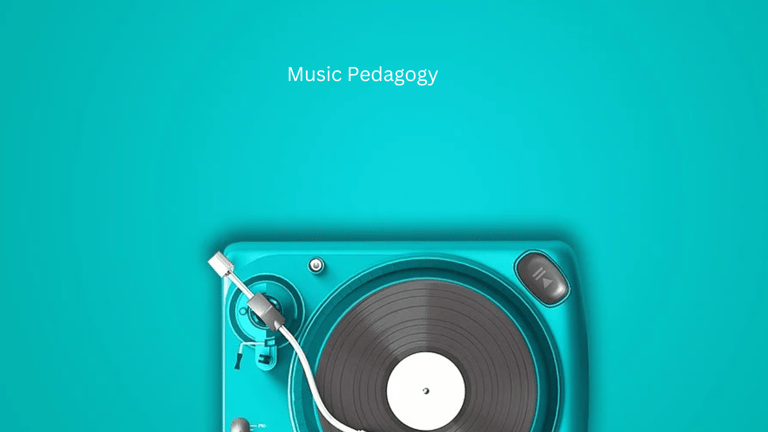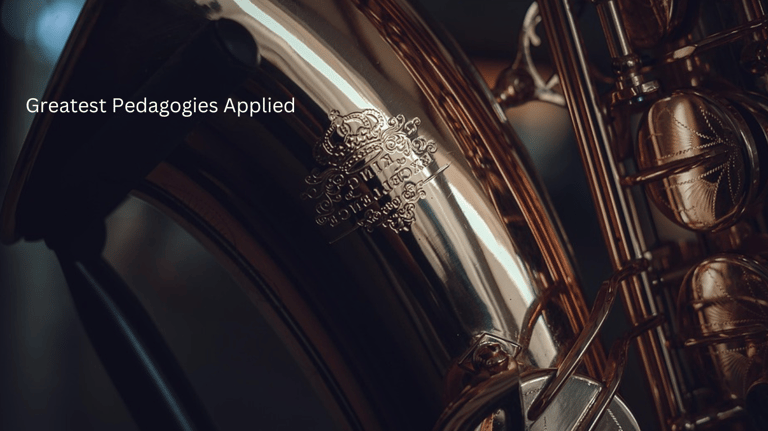Exploring Music Pedagogy Books for Educators and Students
.
1/15/20256 min read


Exploring Music Pedagogy: Resources for Educators and Students
Introduction
Music is more than an ability; it is, in fact, a lingua franca bridging people from different races to different generations. Teaching and learning music approaches bring them all together in music pedagogy. Pedagogy is what the most significant thing that the teachers need to learn so as to communicate efficiently what they are knowing and exercising. In such a way of developing this understanding, the student has to develop proper music resources that support it. The music books are part of the richest resources that support both the teacher and the learner because they provide deep comprehension of theoretical and practical procedures as well as creative activities. This article discovers the world of music pedagogy and marks that are the must-read books for enriched education and students.
Understanding Music Pedagogy
What Is Music Pedagogy?
Music pedagogy, in fact is the art and science of teaching music. It deals with a series of methods, concepts, and techniques that, with a perspective, will teach musical talents in children. Most of the goals allow for the building of the music theory skills as such, allowing allowance for the technical skills and the individual expressions. In as much as it teaches a child how to play the piano or even an accompaniment to the choir, then music pedagogy exists in the heart of the methodology whereby one is teaching. Therefore, there is a balance between abstract knowledge and a practical use which gives it an educational value in education.
Why is music pedagogy important?
Music pedagogy is important since it is more than teaching people notes and rhythms. It makes learners connect with their emotions, have discipline, and be confident. Besides, pedagogy facilitates cultural appreciation because it exposes students to various musical traditions. Pedagogy is the frame in which a teacher can prepare learning for the varied needs of the student such that every learner goes at his own pace. It is not a matter of creating a musician but preparing a total human being.
Key elements of music pedagogy
Music theory and foundations
Music theory forms any music education skeleton framework. It is notes, scales, chords, and rhythms. For the teacher, effective teaching of theory can enable students to read and appreciate music. For example, a book like Practical Theory Complete, Sandy Feldstein boils down complex thoughts into simpler and easier-to-apply concepts by the beginner or teachers.
Instrumental and Vocal Techniques
Learning needs and techniques will differ in each instrument and voice. In piano learning, for example, hand positions would be needed. For violin, bowing style would suffice. Vocal training usually differs very much but within two categories- traditional and contemporary style. As far as reading the references are concerned, one should turn to such literature as Heinrich Neuhaus' The Art of Piano Playing or Cathrine Sadolin's Complete Vocal Technique will serve.
Creative Expression and Improvisation
Creativity is the basis of good teaching. Improvisation, for example, gives the gift of creatively articulating musicality. In particular, the book, Effortless Mastery by Kenny Werner, will be very helpful to guide teachers and students on how to tap their creativity and utilize sporeness in music.
Books for Music Teachers
Books that Music Teachers Must Not Miss
Teachers have much to do to make the life of a student musical. Practical classroom books in teaching have even more than that: such as Teaching General Music, by Carlos R. Abril for one. There are so broad in the sense of text on any subject-matter from the least to planning in lesson for management of the classrooms: Guides on building curriculum.
An appropriately designed curriculum highly contributes to effective teaching. Books that can be used in preparation of an appropriate lesson in light of the child's skills include "Planning Instruction in Music" from Richard Colwell. It provides a preference of adjustment and change in light of the changed curriculum as he has changed.
Other books that can Understand Other Classrooms
Pedagogy About music, the very effective aspect is in serving the needs and learning more inclusive. Adamek emphasized music in special education, which taught access strategies and a better understanding with strategies to keep learning through being different in needs to ensure that the teacher reaches one more student; nobody should stay behind.
Students' Books When Learning Music
Student Books in Musically Beginning their Course
First and foremost, however, it is easy to see that if there is one case more than a case of more is too much, then that is true with more books such as Dan Haerle's Music Theory for Beginners that break the very complicated issue into lesson plans; this puts students in good confidence and actual basis for study.
Advanced Studies in Music
More profound would be the use of advanced materials. Among those books to use is The Complete Musician by Steven G. Laitz, wherein there are chapters that deal with harmony, analysis, and even composition. All these texts try to perfect their students in whatever skill that the students can bring about or introduce.
Recreational Books of Learning
Learning music does not have to be boring. Activity-based music game, such as Michael Grady's Music Games and Activities Kit, makes the process exciting for learners through fun games and activities. They are kept on their toes while retaining some of the very important lessons in their memory .
Books and Role of Music Teaching Books Advantages in Applying Books as Aids to Music Learning
Books are well-arranged material for learning. They contain clear explanations, examples, and exercises that guide a student or instructor. Books are good references that teachers can always rely on while planning their lesson. To a student, the books give room for learning at whatever pace one may consider appropriate.
Mixing Books with Digital Tools
But if the reader wishes, there is still time for books. Traditionally, these books would be found online and, today, are often accompanied by related online resources with text typically appearing in some form of their e-book equivalent, or even an application versions. In this manner, many materials are now accessible to be accessed digitally.
Greatest Pedagogies Applied to Music Studies
Kodály Method
It is basically a method of teaching music that focuses on an activity in the sense of singing. Other forms of music are then introduced using folk songs, hand signs, and solfege. To know more on this method books like Lois Choksy's The Kodály Context may also be consulted.
Orff Approach
The Orff approach teaches in its application: with the inclusion of music, movement, drama, and speech in educating. When given to young learners it is the most resourceful form. For example: Activity and lesson ideas, the Elemental music Pedagogy as given by Peter Amidon goes to explicate Orff-inspirations teachings. Ear-based teaching is known as the Suzuki Method. Mainly, this has been utilized by many early childhood settings. For the first time, there's philosophy in Nurtured by Love, writings of Shinichi Suzuki
Some Challenges Facing a Music Teacher
There are still knowledge gaps in an individual's brains to fill up.
Some are hard for kids to understand some. Some works by Peter Loel Boonshaft on the book Teaching Music with Purpose. The greatest challenge when teaching music is keeping the interest of students. Content as such can thus help the teacher to enable the students being inspired, as discussed in books such as Drive: The Surprising Truth About What Motivates Us by Daniel H. Pink.
Conclusion
Music pedagogy is the ever-evolving field of both tradition and innovation. Books form the basis of the knowledge of both educator and student to open their doors to theory, technique, and creative expression. Whether an old-timer teacher or an emerging musician, going through such resources will make one's knowledge and appreciation for music education shine brighter. Immerse oneself in the ocean of knowledge and take musical voyages to a higher plane.
FAQs
1. What is music pedagogy?
Music pedagogy teaches music, therefore, techniques, methods, and theories that would be used in the progression of musical talent in a learner.
2. Books in teaching music
Books offer standardized instructions and new ideas of teaching and awareness about different learning requirements.
3. Best books for first-time music teaching
The very best book to start teaching music will be Music Theory for Beginners by Dan Haerle.
4. Variation in teaching method - Kodály vs. Suzuki
Kodály is singing and solfege based, while Suzuki is ear training for early childhood.
5. Can Books Be Replaced by Digital Tools in Music Learning?
Books have been supplemented with digital tools but cannot be replaced with the depth and structure textbooks hold.







